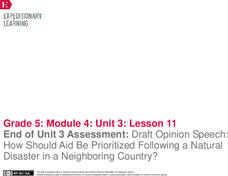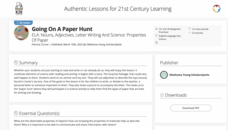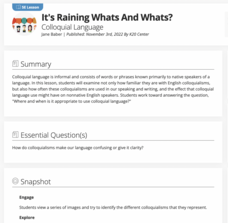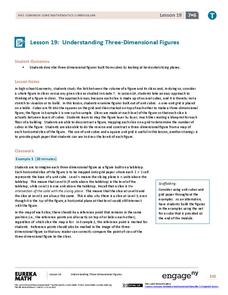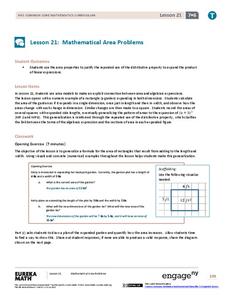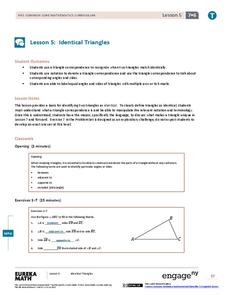EngageNY
End of Unit 3 Assessment: Draft Opinion Speech: How Should Aid Be Prioritized Following a Natural Disaster in a Neighboring Country?
Put it to the test. With the cumulative resource, pupils complete the End of Unit 3 Assessment. Using everything they've learned in the unit, they write a draft of an opinion speech about how to prioritize aid after a natural...
EngageNY
Final Performance Task: Critique and Revision, Part I
Let's work together! Scholars engage in the peer editing protocol, giving and receiving feedback on their draft opinion speeches. They then use classmates' feedback to begin working on their revisions.
EngageNY
Editing Sentences and Creating Visual and Multimedia Displays for a Presentation
Let's get visual. Pupils plan visual displays to accompany their upcoming opinion speech presentations. Additionally, they practice editing sentences for clarity before revising their speech drafts.
EngageNY
Final Performance Task: Critique and Revision, Part II
Stop ... grammar time! Pupils complete worksheets to practice using the correct verb tense and identify correlative conjunctions. Next, scholars apply their new grammar skills to edit their draft opinion speeches.
K20 LEARN
Going on a Paper Hunt: Nouns, Adjectives, Letter Writing and Science - Properties of Paper
A lesson introduces scholars to nouns and adjectives. After listening to a short story and practicing creating adjectives with a card sort, pupils go on a paper hunt to locate different types of paper, complete a chart with adjectives,...
K20 LEARN
My Love Is Like Figurative Language: Figurative Language in Romeo and Juliet
My love is like an anaconda. Huh? Scholars investigate similes, metaphors, hyperbole, and personification used by writers to express feelings. They examine lyrics from songs and lines from Romeo and Juliet and consider how the use of...
K20 LEARN
It’s Raining Whats and Whats? Colloquial Language
"Yuns betta outten the lights!" Colloquial language is the focus of a lesson plan that asks middle schoolers to consider the pros and cons of using idioms. They read articles, match expressions with their meaning and place of origin, and...
EngageNY
Surface Area II
Examine the surface area of composite figures using an exploratory approach. As a continuation of the previous lesson plan of the 29-part series, young scholars develop plans for finding the surface area of composite figures. Examples...
EngageNY
Understanding Three-Dimensional Figures
You can't judge a book by its cover ... or a cube structure by just one face. A creative activity looks at the shape of several cube structures described by level slices. The 20th activity of the 29-part series expects young...
EngageNY
Mathematical Area Problems
Teach the connection between area models and the distributive property through problem-solving. The 22nd activity in a series of 29 explains the distributive property graphically. Learners build area models from word problems and convert...
EngageNY
Slicing a Right Rectangular Pyramid with a Plane
How many ways can you slice a pyramid? The 18th lesson of the 29-part series examines the multiple planes of a rectangular pyramid. Pupils study each slice to determine its shape and relation to the different faces.
EngageNY
Conditions for a Unique Triangle—Two Angles and a Given Side
Using patty paper, classes determine that only one triangle is possible when given two specific angle measures and a side length. As the 10th instructional activity in the series of 29, young math scholars add these criteria to those...
EngageNY
Identical Triangles
Explore vocabulary and notation related to triangles and congruence. The fifth lesson in the 29-part series helps pupils build their knowledge of triangle relationships. Individuals identify corresponding parts of identical triangles and...
EngageNY
Collecting Rational Number Like Terms
Teach pupils to handle fractions fluently. The sixth installment in the series of 28 has class members apply the concepts learned in previous lessons to expressions with fractional coefficients. The fractions are both mixed numbers and...
EngageNY
Complementary and Supplementary Angles
Connect algebraic and geometric concepts to solve problems. The first instructional activity in the 29-part series examines complementary and supplementary angle relationships. Scholars write equations to represent the relationships and...
EngageNY
Solving Inequalities
Investigate complex problem situations by applying inequalities. Building from concepts explored in the previous lesson plan, learners read word problems and develop inequalities to represent the situation. They then solve the...
Other popular searches
- Cellular Differentiation
- Cell Differentiation
- Implicit Differentiation
- Genetic Differentiation
- Differentiation and Math
- Anti Differentiation
- Differentiation Strategies
- Differentiation Rule
- Differentiation Lesson Plans
- Logarithmic Differentiation
- Differentiation Component
- Writing Differentiation
